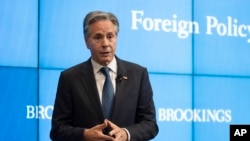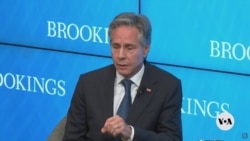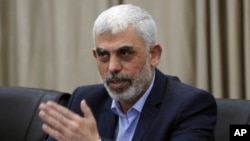The United States is "determined" to prevent military conflict between Israel and Hezbollah fighters based in southern Lebanon from escalating into an all-out war, America’s top diplomat said Monday.
While acknowledging “forces of momentum ... may be leading” toward a war between Israel and Hezbollah, Secretary of State Antony Blinken said, “None of the main actors actually want a war.”
“I don't believe Hezbollah actually wants a war,” he told an audience at the Washington-based Brookings Institution. “Israel doesn't want a war, although they may well be prepared to engage in one if necessary. ...
“Lebanon certainly doesn't want a war because it would be the leading victim in such a war,” he added. "And I don’t believe that Iran wants a war, in part because it wants to make sure that Hezbollah is not destroyed and that it can hold onto Hezbollah as a card if it needs it."
Blinken’s comments come as Israel signals that a military "downshift" in Gaza would allow its forces to allocate more resources to addressing the threat posed by the Iran-backed Hezbollah on the northern front.
As Blinken spoke, pro-Palestinian protesters outside the Brookings Institution could be heard through his microphone.
Blinken renewed his call on Hamas' leader in Gaza, Yahya Sinwar, to accept a U.S.-proposed Gaza cease-fire and said Washington is “determined not to be outpaced” in Gaza's post-war reconstruction.
“We know that there are three things that are unacceptable for Gaza's future: an Israeli occupation; Hamas perpetuating its leadership; or chaos, anarchy, lawlessness, which is what we're seeing in big parts of Gaza today.”
In Jerusalem, Prime Minister Benjamin Netanyahu on Monday said Israel is “advancing to the end of the phase of eliminating” Hamas' military capabilities in the Gaza Strip, nearly nine months into Israel’s war with the militants.
Blinken also defended U.S. President Joe Biden following Thursday night's presidential debate with former president Donald Trump, which many deemed a disappointing performance by Biden. Blinken said that U.S. allies “like the choices and the policies" Biden is pursuing.
China
In his foreign policy speech on Monday, Blinken also addressed China.
“I think China's objectives are clear. Over time, over the coming decades, they would like to be the leading country, the dominant country in the international system, militarily, economically, diplomatically, that's clear,” said Blinken.
While the U.S. has stated that its goal is to responsibly manage competition with China, the government in Beijing has refuted this, saying the relationship between the world’s two largest economies should not be defined by competition.
Chinese officials have said that “major-country competition” provides “no answer to the problems in the U.S. or the challenges in the world.”
The U.S. will host a NATO summit in Washington from July 9 to July 11, with a focus on European security amid Russia’s ongoing war against Ukraine.
Four countries from the Indo-Pacific region — Australia, Japan, South Korea and New Zealand — are set to attend the summit.
Secretary Blinken warned that while China is not directly providing arms to Russia, its supply of critical materials has helped Moscow sustain its war on Ukraine, posing serious repercussions for European security. Blinken said that 70% of Russia's imported machine tools and 90% of its microelectronics come from China.
Chinese officials have rejected what they describe as Washington's "smear," asserting that Beijing regulates the export of dual-use articles in accordance with its laws and regulations.
















